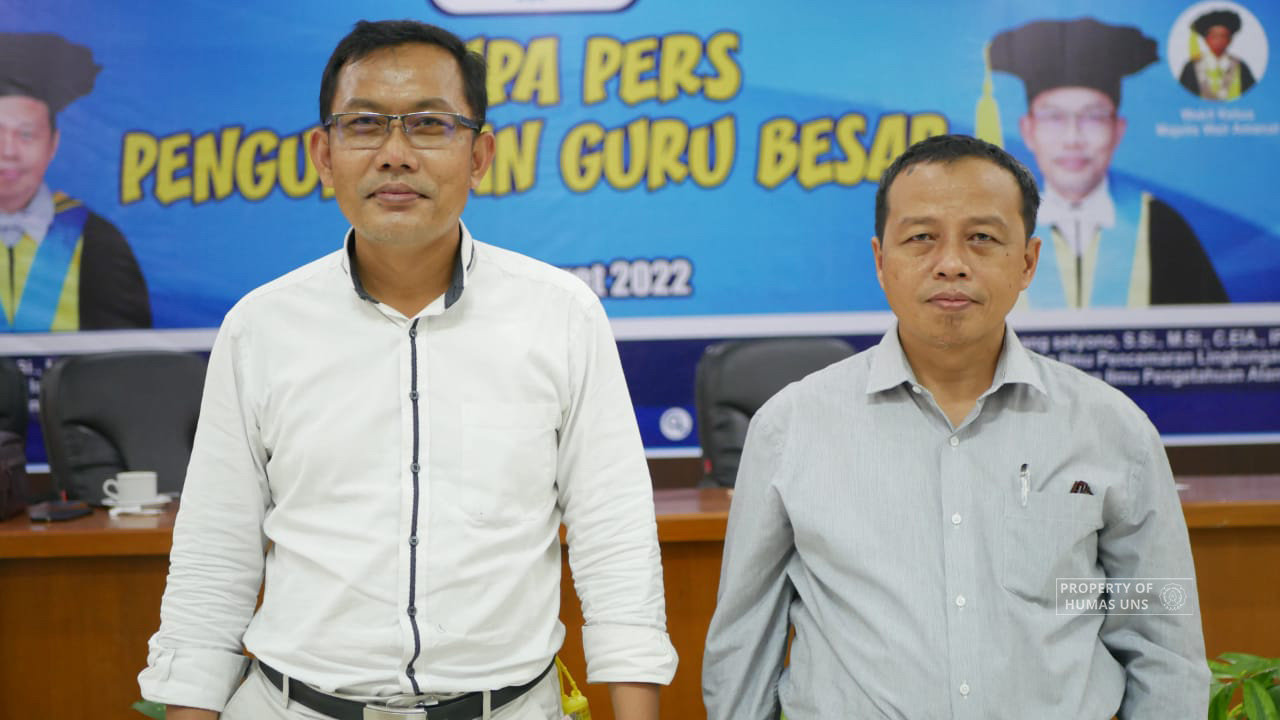UNS — Nearing UNS 46th Anniversary, Universitas Sebelas Maret (UNS) Surakarta added two new professors from the Faculty of Mathematics and Natural Sciences (FMIPA). The two Professors are Prof. Nuryani, S.Si., M.Si., Ph.D., and Prof. Dr. Ir. Prabang Setyono, S.Si, M.Si. These two professors will be inaugurated in the Open Senate Session on Tuesday (8/3/2022) through a hybrid session at the UNS G.P.H. Haryo Mataram Auditorium.
Prof. Nuryani, S.Si., M.Si., Ph.D., is the 21st Professor in FMIPA UNS and the 246th Professor in UNS. He will be inaugurated as a Professor in Medical Instrumentation Sciences from the Physics Study Program, FMIPA UNS, with an inauguration speech titled ‘Development of Medical Instrumentation with Electrocardiograms-Based Smart Systems to Support Health Equipment Independence.’
An electrocardiogram is essentially a representation of the heart’s electrical activity, resulting from electrical signals coming from parts of the heart, which are measured by time levels. Electrocardiogram data can provide heart disorders and other heart-related body disorders.
“A system equipped with certain computational intelligence techniques for processing electrocardiogram data can be used as a detection system for certain body disorders. This computational intelligence can perform a learning process or electrocardiogram data patterns recognition. This process is known as abnormal electrocardiogram patterns due to body disturbances and normal electrocardiogram,” explained Prof. Nuryani on the sidelines of the Professor Inauguration Press Meeting at UNS Inn, Monday (7/3/2022).
With its ability to recognize electrocardiogram data patterns and decision-making ability, this system can provide information on whether certain bodily disorders occur or not. Thus, this system can help patients or users expedite the identification process on certain body disorders because this system works on a computer-based basis. This system is also known as a detection system. Systems following these working principles include hypoglycemia (low blood sugar) and obstructive sleep apnea (OSA) detection systems. This system can be implemented for atrial fibrillation (AF) and premature ventricular contraction (PVC) detection systems for cardiac disorders.
In this detection system, certain intelligence techniques or hybrids/combinations of two intelligence techniques can be adopted, such as support vector machine (SVM), artificial neural network (JST), and fuzzy inference system (FIS). Other intelligence techniques can also be implemented to improve the performance of these intelligence techniques, for instance, using particle swarm optimization (PSO) techniques.
Meanwhile, Prof. Dr. Prabang Setyono, S.Si, M.Si. will be the 22nd Professor of FMIPA UNS and the 247th Professor in UNS. He will be inaugurated as a Professor in Environmental Pollution Sciences from the UNS FMIPA Environmental Science Program with an inauguration speech entitled ‘Mitigating Environmental Pollution in the Perspective of SDGs (Sustainable Development Goals) Towards a Nation’s Civilization.’
“I chose this title to emphasize that the environmental pollution mitigation greatly contributes to the achievement of the SDGs, which will ultimately lead to an increase in the nation’s civilization towards sustainable development patterns,” explained Prof. Prabang.
The definition of environmental pollution based on Law Number 32 of 2009 concerning Environmental Protection and Management in Article 1 item 14 stipulates that environmental pollution is the entry or inclusion of living entity, substances, energy, and/or other components into the environment by human activities, which exceed the established environmental quality standards.
Indonesia’s environmental problems are complex due to their multidimensional nature; hence, the approach needed to find the best solution must be based on the SDGs context and concept with more visible goals measurability. Environmental problems in Indonesia are dominated by environmental pollution such as water pollution, soil pollution, and air pollution, with the top ten environmental problems are garbage, flooding, polluted rivers, global warming, air pollution, the destruction of marine ecosystems, clean water scarcity, forest damage, abrasion, and soil pollution. A prevalent issue in the case of environmental pollution in Indonesia is the industrial waste and household waste problem.
The Environmental Pollution Mitigation can be carried out through various methods such as SMART GOALs approach, where S (Specific) means that the analysis of pollutant content must be specific to facilitate specific mitigation action according to its characteristics; M (Measurable) means that the quantity and quality of pollutants must be measured according to established standards; A (Attainable) means that the achievement of pollutant mitigation objectives from ecological aspects can be measured based on space, spatial, budget, and methodology; R (Relevant) means that pollutant mitigation must be relevant to the methods of identification and analysis approach based on relevant and updated science and technology; T (Timely) means that the complexity of environmental pollution case must have a clear and measurable handling time that will facilitate the achievement of the goals in environmental pollution mitigation within the SDGs perspective.
Environmental pollution is a phenomenon that starts from an exploitation process up to the production process that will encumber the environment. If it is not managed with an environmentally friendly concept, it will decrease the quality of the environment, which will lead to negative impacts in the form of environmental disasters because of environmental pollution with no proper mitigation.
“Ecological justice as a new platform in achieving the Sustainable Development Goals will be the source of a nation’s new civilization. The nation’s civilization was built by the hegemony of human welfare based on economic and socio-cultural values; thus, in the future, the New Civilization discourse in a nation will be achieved if a country has succeeded in realizing Ecological Justice. Environmental Pollution Mitigation is one of the leveraging factors in accomplishing ecological justice,” concluded Prof. Prabang. Humas UNS
Reporter: Dwi Hastuti

